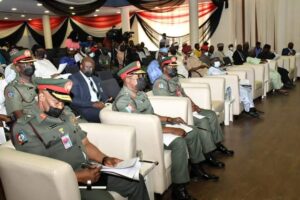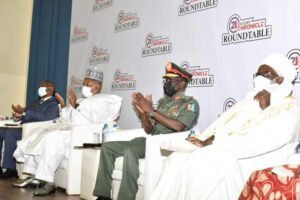COMMUNIQUE AT THE END OF THE FIRST CHRONICLE ROUND-TABLE ORGANISED BY 21ST CENTURY CHRONICLE ON THE THEME: “GOING FOR BROKE: FIGHTING INSECURITY IN NIGERIA,” HELD AT SHEHU YAR’ADUA CENTRE, ABUJA ON WEDNESDAY, FEBRUARY 23, 2022.
Preamble:
Insecurity, characterized by terrorism, banditry, herders-farmers conflict, kidnapping for ransom, separatist agitations, cult killings and ritual murder, permeates the Nigerian landscape from North to South, East to West. Terrorism, for instance, has lingered for over a decade, in spite of government and the military’s campaign to defeat it. The situation has created an atmosphere of perpetual fear, disharmony in polity and governance, disoriented the economy and discouraged some foreign investors.
The First Chronicle Roundtable organized by 21st Century Chronicle was intended to dissect the problem and proffer short-term and long-term solutions to it.
Royal Father of the Day was HRH Malam Muhammadu Awwal Ibrahim, Emir of Zazzau Suleja.
There were Morning and Afternoon Sessions.
Senator Kashim Shettima, former Governor of Borno State, chaired the morning session. Guest Speaker at the morning session was General LEO Irabor, Chief of Defense Staff, who spoke on “Armed Forces and the War Against Insecurity in Nigeria.”
Major General Chris Olukolade [retired], a former Director, Defense Information and Dr Mairo Mandara, a gynaecologist, NGO activist and Special Adviser to Borno State Governor on Sustainable Goals and Partnerships, discussed General Irabor’s paper.
Mr. Femi Adesina, Special Adviser to the President on Media and Publicity, chaired the Afternoon Session where two papers were presented.
The first paper of the afternoon session, on “Reducing Tension as Election Year Approaches,” was presented by Professor Jibrin Ibrahim of the Center for Democracy and Development (CDD). It was discussed by Professor M.J. Kuna, Special Assistant to INEC Chairman, and Professor Jideofor Adibe of Nasarawa State University, Keffi.
The second paper by Mr. Dan Agbese, a renowned journalist, was titled “Media and Peace Building in Nigeria.” Hajiya Zainab Okino, Chairperson of the Editorial Board of Blueprint newspapers, Abuja, discussed the paper.
The Roundtable was attended by prominent Nigerians, top military and security officials, federal and state government officials, members of the National Assembly, diplomats, civil society organizations, representatives of paramilitary agencies, traditional rulers, and the creme-de la-creme of the media in Nigeria.

The Communique:
At the end of the event, the following communique was adopted:
1. Nigerians are passing through a very difficult period due to insecurity which has led to wanton destruction of lives, property, infrastructure and has caused social and political tension. Therefore, all Nigerians must put aside ethnic, religious, political and class differences and rise as one to collectively tackle the existential challenge.
2. Nigerian Armed Forces and other security agencies received high praise for their commitment to the fight against insecurity and the sacrifices their officers and men have made, including paying the supreme price in order to secure the country from criminals and other enemies within.
The fight against insecurity must be depoliticized. Criminals must not be shielded from justice by their kith and kin on sentimental regional, religious or political grounds
3. Unemployment, population growth, pandemic, slow economic growth and lack of social safety net due are some of the underlying drivers of terrorism and criminality in Nigerian society. Therefore, government must reposition the economy as a grand measure to tame insecurity.
4. As a way forward in tackling insecurity, the Roundtable called for the following:
(I) Improved intelligence gathering through surveillance and reconnaissance strategies to facilitate precision in military operations against criminals.
(II) Retraining and reequipping Nigeria Police to carry out its constitutional function of effectively fighting criminals across the country in order to reclaim many internal security duties that over the years have been taken over by the armed forces due to necessity.
(III) National security is an expensive business that must be invested in times of both war and peace. Government should urgently budget and provide the necessary resources for the recruitment of more soldiers, policemen, their training, welfare, and the acquisition of weapons and technology to facilitate the fight against insecurity in Nigeria.
(IV) Traditional institutions in Nigeria should be made to play a role in the fight against insecurity because of their unique position in accessing intelligence information and their closeness to the grassroots, where acts of criminality and terrorism are more prevalent.
(V) Corruption in defense spending weakens the fight against terrorists. Therefore, the military and security agencies should ensure transparent and accountable utilisation of resources allocated to them. Also, there should be strategic use of available meagre resources for optimum benefit.
(VI) Nigeria should immediately commence the development of its military industrial complex to world class levels in order to produce military hardware locally, bring down its cost and also reduce dependence and the associated delay and political blackmail involved in importing military hardware. The task of building this complex should be undertaken essentially by the private sector but government should put in place the necessary measures and incentives.
(VII) No effort should be spared to create synergy and coordination involving all stakeholders in the fight against insecurity.
(VIII) Our country’s public prosecutors and judiciary should rise to the occasion and ensure speedy dispensation of justice in cases involving terrorism and criminality all over the country. At the moment, terrorism cases drag on for too long, leading to delayed justice.
(IX) The fight against insecurity must be depoliticized. Criminals must not be shielded from justice by their kith and kin on sentimental regional, religious or political grounds.
(X) We must strive to ensure social justice and equity in our society because they are the main drivers of insecurity and criminality. An equitable approach to wealth distribution should be the long-term basis for discouraging criminality in Nigerian society.
5. Since 2011, there has been steady improvement in the credibility of elections in Nigeria with the introduction of technological tools and production of a credible voters’ register. President Muhammadu Buhari should build upon this positive development by signing the amended Electoral Bill into law without delay, to give legal backing to the use of technology in conducting elections.
6. There is growing tension in Nigeria as 2023 general elections approach. Tension often leads to insecurity where lives are lost, property is damaged and the credibility of the elections is put in doubt. In order to reduce tension as 2023 elections approach, INEC and security agencies must shun partisanship and political actors should adhere to the rules of the game in their conduct.
7. Although the Nigerian news media has played a generally positive role in the search for peace in Nigeria, other areas of concern remain, especially with the rise of social media. Efforts should be stepped up by editors and media owners to entrench professionalism and uproot all the vices that assist criminals in the country.

8. The media must embrace responsible reporting to prevent the escalation of tension and conflict by abiding by the tenets of fairness, justice and national interest.
9. There is need to build the capacity of journalists to engage in conflict-sensitive reporting. The code of media ethics should be strengthened and regularly taught in newsrooms.
10. Participants at the Roundtable commended 21st Century Chronicle for organizing it and for providing an opportunity for the rich exchange of ideas that will go a long way to promote peace and peaceful coexistence in Nigeria.
THEOPHILUS ABBAH, PhD.,
ROUNDTABLE RAPPORTTEUR


